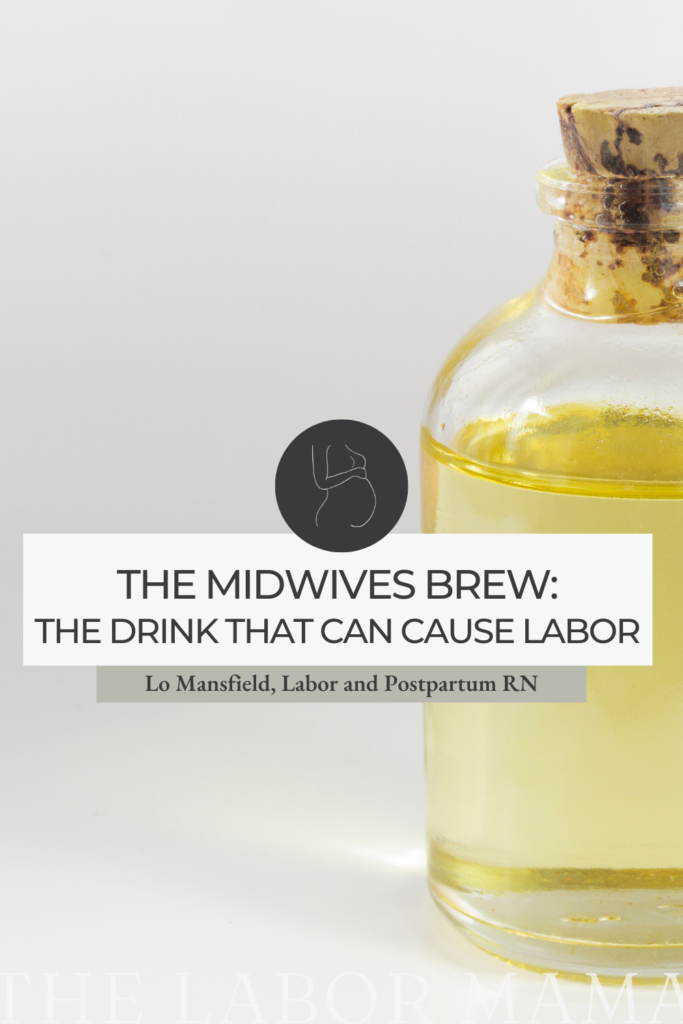Feeling reallllly big and pregnant and ready for it all to be over? Did I catch you googling “natural labor induction methods” because you are so ready to be done (hands up, I’ve been there too)! Is your due date behind you and you’re so desperate to meet your baby?
If any of these is a yes, keep reading. You’ve got to learn about The Midwives Brew! This natural induction method isn’t super well known, there are definitely some important “rules” around it, and some think it’s crazy to try. So, let’s get into the secrets a little bit more and let you decide if you want to try it.

Who is The Labor Mama and Why Am I Here?
Who is The Labor Mama and Why Am I Here?
Hey friend! I’m Lo – also known around here and social media as The Labor Mama. I’ve spent my nursing career in labor, delivery, and postpartum, have birthed 4 of my own babies, have labored thousands of mamas at the bedside, have taught thousands of students online, and have even delivered a few speedy little babies with my bare hands (oops).
Here at TLM, I offer online classes about birth, postpartum, newborn care, and breastfeeding to empower you the way everyone should be. The education + support I offer gives you experience, evidence, and empathy; you’re getting all of my years of “clinical” RN knowledge, honestly combined with my real experiences as a mama, nurse, and CLC. These are not your average hospital classes (those won’t do it, I promise), and honestly, birth, postpartum, and breastfeeding don’t follow a textbook or protocol anyway. You need to know so much more than that!
If you want to connect with me further, head to Instagram. There are hundreds of thousands of us over there learning together daily.
A note: This post may include affiliate links. This means if you make a purchase after clicking a link, I will earn a small commission (thank you)! Rest assured, this comes at no additional cost to you. You can read TLM’s full disclosure here.
What is midwife brew?
Let’s start with the basics, okay? Midwives Brew is a 4-ingredient induction drink that some mamas start chugging to try and naturally induce their labor at home. It’s simple to make, the ingredients are easy to find, and anecdotally, there are a lot of mamas who are sure this is what kicked started their labor.
In the EU, this drink is commonly referred to as The German Labor Cocktail. It’s used a lot by midwives over there. So, if you’re googling other mama’s stories about it, you may come across that term too.
When to drink the midwives brew?
🛑🛑🛑 Before you go ANY farther, you need to know these two things. They are super important.
- Talk to your provider before you try this. You must!
- Do not do this until you are past your due date!
Personally, I would absolutely not try this if you knew baby were not in an optimal position for birth either. You can read more about that (and how to get them into a good position) here.
Ok, so now that you saw the rules, let’s circle back to when to do it. Like I mentioned, no one should be trying midwives brew before their due date! This drink is absolutely meant to cause uterine contractions and it is not recommended that anyone drink it until they are past 40 weeks of pregnancy.
More about Castor Oil (the “working” ingredient in this cocktail) is right here. Read this as well!
Midwives brew ingredients
Ok, so what are those 4 ingredients in the midwives brew?
- 10 oz Apricot Juice
- 8 oz (brewed) Lemon Verbena Tea
- 2 Tbsp castor oil
- 2 Tbsp almond butter
Directions
Nothing is too complicated here! You’ll want to boil some water to first brew your tea. Once the tea is ready, mix all the ingredients together. If possible, try blending them. Once it’s done, drink it within 30 mins or so on an empty stomach. I’ve seen people say you can drink it cold or room temp. Anecdotally, people seem to think it’s more effective at room temp, but some need it to be cold to actually get it down.
Ready to add to cart? ? You can find all the ingredients here.
Is the success rate really 85%?
Anecdotally, a lot of mamas RAVE about this drink. If you dig around about midwife brew, you’ll find people quoting success rates of 75%-85%! For most, they are calling the brew a success if it put them into labor within 24 hours. I’ve talked about this before on my Instagram community, and there definitely are a ton of stories about drinking this drink (remember, after your due date and with provider approval!) and then going into labor.
Here’s a few comments from that IG discussion:
“It works! I drank this cold and blended. Replaced tea with water. Baby was here within 4 hours after drinking.”
“I did it and it WORKED! i was to be induced on the monday and it was friday so i was desperate! labour was SUPER QUICK which i can’t complain about but i didn’t expect that ?.”
“It definitely worked for me! I drank something similar (no tea), before my first. I drank it around 9pm, at 41 weeks, and had my baby the next morning at 11:27am!”
“This was the worsttttttt. Definitely put me on my hands and knees from the contractions and then I threw 90% of it up ????.”
“I took it at 41 +1 trying to avoid a hospital induction and it didn’t work. But, it also didn’t negatively affect me either! Maybe the two are related? I was nervous about it making me sick but it didn’t, and it wasn’t too bad to drink. Definitely would try it again!”
“My midwives had me do this at 41+5. It was DISGUSTING and I puked like 10min after drinking, but contractions started within an hour. However, my babe was asynclitic and not ready to come out, so it was another 30hrs before he arrived”
I have to tell you, there is NO evidence to confirm that the brew does work OR that it is effective as much as 70 or 80%. But, there is evidence about castor oil for natural induction, and some of it does show that taking castor oil is effective for cervical ripening and for labor induction.
Related reading:
Primrose Pills for Labor Induction
The Miles Circuit: Can It Induce Your Labor?
What is a Membrane Sweep and Should You Try One?
Is drinking midwives brew safe?
You can see from those comments that there are definitely some cons related to trying the midwives brew or castor oil. And it’s true – you gotta know…its side effects/other effects can be pretty unpleasant. ? ? ?
Generally, many people don’t recommend castor oil as an induction agent because one of its side effects is that it can cause nausea, vomiting, and diarrhea. If this is going on, one of the natural consequences is that you end up dehydrated. Dehydration can then cause stomach cramping, contractions, and maybe, full blown labor. But for some, the cramping and contractions are just painful, you’re uncomfortable, but they aren’t actually labor (and you probably can’t sleep or rest either). And ideally, you aren’t headed into labor dehydrated.
If you’re digging around more about this, you may also hear that baby passing meconium is more common for labor in which castor oil was used. This has not been proven, but it is a highly debated risk and the reason many choose not to try it. It’s also another reason to support waiting to try this until after your due date passes.
If you are waiting on the baby and wanting (needing) to learn more about all the natural induction tools and everything else that birth may throw ya’, I’d love to teach you inside of my birth courses. 100% online and on demand, you can start learning what you need to know right now to have an educated, empowered birth (any type of birth) where you feel crazy confident making decisions throughout all of it.
Why midwives brew works
One of the reasons people feel that the brew specifically, as opposed to just castor oil, is more efficient is because of the other ingredients. Castor oil on its own moves pretty quickly through the stomach (causing the vomiting and/or diarrhea). But with the midwife brew, some think the fat of the nut butter helps the castor oil “stick” to your GI system and that it can help reduce stomach spasms. Then, you may have less of the pooping/diarrhea and related dehydration, but you still get the benefits of stomach cramping and/or contractions that actually lead to real labor.
The takeaway on midwives brew for labor induction
So, what do you think? Worth trying? I love hearing about this method, simply because the stories are all over the place! If you’re considering for yourself, remember the rules around it, be aware of those unpleasant side effects, make sure to chat with your provider, and then make your choice! if you want to see more stories from others who have tried it, read through the captions on the IG post!
Have you tried it? Would you? Let me know in the comments! xx- Lo

More resources (and freebies!) for you to take a peek at:






Details of my experience!… I was 41 +2 at my appointment with my midwifery group. I consented to a cervical exam and was 3cm, soft, 50% effaced, and baby was high. I chose to schedule an induction for 41+4 after getting the option for that or to wait until 42 weeks. I asked my midwife about midwives brew and she stated “I can’t tell you to do it or not to do it…” I decided to try it the next morning. Drank it at 7:30am, contractions started at 10:30am and my son was born at 2:59pm! I didn’t have any unpleasant side effects and I feel that although my labor was quick, there was a gradual build up. I chose to try the midwives brew because after researching side effects of that vs side effects of medical induction methods, I decided I was more confident with the brew in the comfort of my own home. I hope some day a full research study will be done for it!
Thank you for sharing! Love these stories. That last thought from you; personally, I agree so much! If we’re looking at more medical induction tools, then I absolutely can see why someone would choose this, membrane stripping a couple times, etc. as an option first. And I agree – would LOVE if there were more research on it too! But research on the pregnant population is always so hard to do!